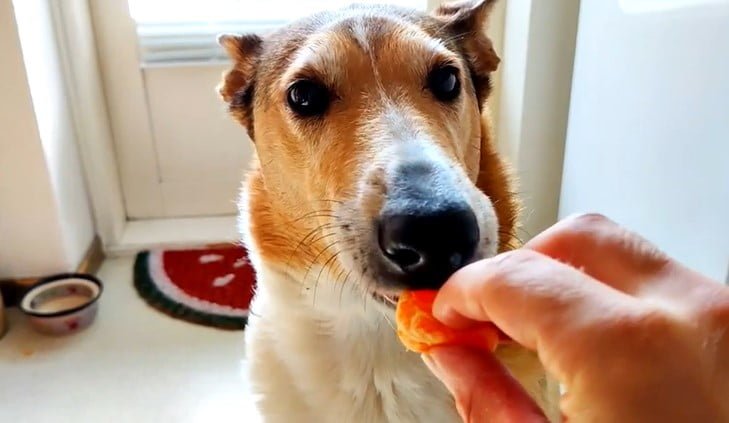As a responsible dog owner, you must be aware of the care and overall well-being of your fur pal; the basic needs that your pet requires include, what and what not exactly they can eat. In most cases, dogs are off-limits when it comes to snacks that we enjoy, however, there may be some exceptions. So, if you’ve ever wondered can dogs eat mandarins? Today we’ll tell you all about it.
It is widely recommended that dogs shouldn’t eat our food, that’s pretty much the reason why exists dog food and dog snacks. It is because their food is packed with the nutrients they need to stay healthy. As you can tell by now, a dog’s diet isn’t something to mess with, our pets can actually become very sick if they ingest the wrong food and may end up taking an emergency trip to the vet.
Some food can be fatal for our pets and damage their digestive system, there are however certain foods that are safe to share with them. We get it, it’s pretty hard not to give them a piece of your snack when they look at you with those big puppy eyes. If you aren’t sure what not to feed your pooch, doing some research is always a good idea. Learn all about, can dogs eat mandarins?
Can Dogs Eat Mandarins FAQs
Can Pomskies eat mandarin oranges, tangerines, or clementines?
Yes, your pomsky and any dog can safely eat these citrus fruits so long as they are peeled and fed in moderate amounts. Mandarin oranges are somewhat flat on the ends and have slightly different flavors than standard oranges.
Is Citrus toxic to dogs?
All citrus fruits are safe for your dog if not offered in large amounts. Dogs rarely accept the tart, acidic taste of lemons, limes, and grapefruits, but will try a sweet orange section.
Can Dogs Eat Mandarins and How many mandarins can dogs eat?
Experts state that dogs can eat up to an entire standard orange, depending on the size of both the fruit and the dog. A segment or two of a mandarin daily should not harm them, and Vitamin C is water-soluble, so any excess shouldn’t accumulate in the body.
What happens when a dog eats a mandarin?
Mandarins are high in acid, which can lead to gastrointestinal upset. The extra sugars are a no-no for doggos. Even though the sugars found in mandarins are natural and fine in moderation, adding more sugar to your dog’s diet is never recommended because of the risk for weight gain and blood sugar regulation issues.
What happens if a dog eats orange peel?
Orange peels are not toxic, however, they can become lodged in your dog’s digestive tract, causing an obstruction and requiring surgery to correct. It’s best to keep oranges out of your dog’s reach for those reasons.
Can dogs experience digestive discomfort if they eat mandarins?
While mandarins aren’t considered toxic for dogs, these types of oranges should not become a regular part of their diet. Because while most dogs can eat mandarins without risk of serious medical repercussions, that doesn’t mean there won’t be some digestive discomfort.
Keep in mind, pomskies or other dogs don’t have the ability to break down plant matter like herbivores. When you give them high-fiber foods, they can experience blockage and uncomfortable bloating.
What do vets say about feeding mandarins to your dog?
Vets say that dogs can eat up to one whole mandarin without feeling too uncomfortable. Even if they had some vomiting or diarrhea, they’re probably not an insignificant medical danger. As long as the vomiting and diarrhea pass normally, the mandarins won’t be a big threat to their immediate safety.
Should you call a vet if your dog ate mandarins?
If your dog got into a whole crate of mandarins and ate several, peels and all, it’s worth calling up your vet and letting them know what’s going on. Probably, your dog will feel significant discomfort and may need to be seen by a professional.
What is it about mandarins that are bad for dogs?
- Sugar: Mandarins contain a high amount of sugar that can lead to tooth decay, obesity, diabetes, and other health problems for your dog. Studies show that obesity is on the rise, and as many as 45% of dogs over four are overweight. That statistic alone is enough to caution against adding any unnecessary sugar to your pet’s diet.
- Seeds: Clementine‘s do not contain seeds, but mandarins and tangerines do, and these seeds contain trace amounts of cyanide that can potentially cause health issues for your pet. While the amount needed may be large, and your pet will need to chew or crush the seeds to expose the cyanide, the risk is present.
- Peels: The peel of a mandarin is very sour and is difficult for your pet’s digestive system to break down, which can lead to an upset stomach, vomiting, and diarrhea. Another problem with eating the peels is that they are very likely to contain pesticides, and these pesticides can prove extremely toxic to your pet’s health.
- Upset Stomach: Even if you remove the seeds and the peel, feeding your dog too many mandarin oranges can cause them to have an upset stomach and possibly diarrhea.
Why you should feed some pieces of mandarin to your dog?
- The mandarin has plenty of vitamins, especially vitamin C, which acts as an antioxidant, warding off disease and keeping your pet healthier.
- The vitamin A present in the mandarin will help protect your dog’s mucus membranes and boost night vision.
- There are also many minerals present in mandarin, including calcium, iron, copper, magnesium, manganese, potassium, and zinc. These minerals take part in countless processes within the body and help energize your pet and keep it healthy.
- The mandarin also contains a lot of water to hydrate your pet and prevent the onset of constipation.
Can Dogs Eat Mandarins Summary
- Mandarins aren’t toxic for dogs, but they’re not good for them either. There are much healthier snacks to share with your four-legged friend.
- If your dog is a healthy weight and has no problems with diabetes or other health problems, it’s fine to give your dog a few mandarin orange slices now and then.
- Make sure you remove the seeds and skin before serving, and it’s best to wait until your pet has eaten dinner, so the mild citric acid doesn’t upset their stomach.
- If you notice any adverse reactions to the fruit, no matter how minor, quit feeding it immediately. If there is a problem, the first signs will be an upset stomach, diarrhea, and possibly hyperactivity from too much sugar.
Fruit Treats Safe for Dogs
Fruitables Baked Dog Treats
Everything’s better with Pumpkin! Real Pumpkin and sweet apples combine for a taste that will drive your dog wild.
Made with superfoods, our oven-baked dog biscuits are both healthy AND delicious. CalorieSmart is our way of saying we use pumpkin to help reduce calories so you can keep treating your pet guilt-free.
Fruitables baked dog treats have a unique flower shape and a satisfying crunch that dogs love.

Features:
- All Breed Sizes
- Pumpkin Apple Flavor
- CalorieSmart
Wholesome Pride Apple Slices
Wholesome Pride Apple Slices are a soft, 100% natural treat made simply with dehydrated apples.
These vegan, gluten-free, and grain-free treats have no artificial ingredients, fillers, or artificial preservatives, making them easy to digest and a great choice for pups with food allergies or sensitive bellies.
Wholesome Pride dog treats are a tasty way to teach your dog new commands and tricks without compromising their health.

Features:
- All-Natural
- Soft



